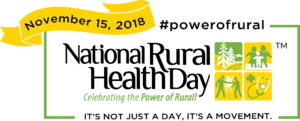More than 60 million Americans live in rural communities, and often, these men and women are underserved when it comes to basic health care needs.
Campbell University is committed to serving the underserved, and for the second straight year, will celebrate National Rural Health Day (Nov. 15) with a series of events aimed at better understanding rural areas and improving overall health.
 “This week is an acknowledgement that Campbell’s roots are rural and our central commitment is to our neighbors,” said David Tillman, chairman of Campbell’s public health department. “We are inspired by the work being done by our faculty, students and community partners to expand access to high-quality health care in rural places.”
“This week is an acknowledgement that Campbell’s roots are rural and our central commitment is to our neighbors,” said David Tillman, chairman of Campbell’s public health department. “We are inspired by the work being done by our faculty, students and community partners to expand access to high-quality health care in rural places.”
Campbell President J. Bradley Creed said serving North Carolina’s rural and underserved communities has been part of the University’s mission since 1887.
“It’s part of the DNA of who and what we are at Campbell,” Creed said. “Students from our health science programs are to be commended for their outstanding work in rural Harnett County and across eastern North Carolina, but we can identify similar work among our academic departments including business, divinity, education, law and other programs who are training many next generation leaders for these communities.”
The following are some of the events happening this week and some of the ongoing efforts connecting Campbell with its rural friends and neighbors.
The Power of Rural

Last spring, Campbell Magazine featured several faculty, staff, students, alumni and friends of Campbell University who are making a difference in their rural communities. “Power of Rural” included stories about Lillington pig farmer Tom Butler, who is working to reduce the environmental impact of his farm and turning pig waste into renewable energy to power nearby homes. The magazine also featured students who care for uninsured patients ever Tuesday night in Campbell’s health clinic; Tillman, who launched a rural oral health conference on Campbell’s main campus last year; an alumna who comforts and counsels patients and their families at a hospital in Nash County; and health sciences faculty who are caring for migrant farm workers in North Carolina who otherwise wouldn’t have adequate health care.
- Power of Rural: Lillington pig farmer Tom Butler
- Friend to the Farmworker: Caring for North Carolina’s migrant workers
- Migrant Medicine: Professor’s faith leads her to care for underserved
- Student Doctors: Tuesday night health clinics for the uninsured
- The Public Eye: Dave Tillman and Campbell’s rural health focus
- Sacred Silence: A friend to patients and families in Nash County
- Real Change: Campbell’s Rural Philanthropic Analysis
Clinical Rotations
The Jerry M. Wallace School of Osteopathic Medicine currently has 15 students on its “rural and underserved” clinical rotations. These are month-long clinical experiences which are unique to Campbell, conceived as a way to “care for the rural and underserved populations of North Carolina, the Southeastern United State and the nation.” These students are serving in seven key regions of North Carolina — Lumberton, Fayetteville, Raleigh (focusing on rural areas like Benson), Harnett County, Salisbury, Goldsboro and Morehead City.
- In the Field: A Day in the Life of a third-year medical student on rotations (Digital Magazine)
- In the Field: A Day in the Life of a third-year medical student on rotations (Online story)
Community Care Clinic
Campbell’s Community Care Clinic is open Tuesday evenings at the health clinic on Campbell’s main campus. The Tuesday night clinic is an interprofessional opportunity in which multiple learners from Campbell’s programs in medical, pharmacy, physician assistant studies, physical therapy, nursing, and public health work together each week to bring quality care to patients lacking health insurance from local rural and underserved communities.
Hurricane Florence relief
Campbell’s Public Health program will lead a group of 20-plus public health master’s students to volunteer with Baptists on Mission on Nov. 17, where they will clean up flood damaged homes in rural Brunswick County. In September, Campbell formed a 20-member task force, headed by Associate Vice President for Spiritual Life and Campus Minister Faithe Beam. The group’s initial meeting focused on areas of need, potential partnerships with local and state organizations and assets and professional resources at Campbell that can assist in the relief efforts.
- Campbell forms Hurricane Florence relief task force
- Campbell Athletics’ “Heal the Teal” initiative provides help to coastal schools
Rural Clergy Grant
Campbell announced this week it has received a grant of $995,627 to help establish the Fellowship for Clergy in Rural and Underserved Areas. The grant is part of Lilly Endowment Inc.’s Thriving in Ministry, an initiative that supports a variety of religious organizations across the nation as they create or strengthen programs that help pastors build relationships with experienced clergy who can serve as mentors and guide them through key leadership challenges in congregational ministry. The grant allows Campbell to establish the Fellowship for Clergy in Rural and Underserved Areas, a 12-month cohort model led by the Campbell University Center for Church and Community.
- Campbell’s near $1 million grant will allow rural clergy to ‘flourish and thrive’
- Campbell earns grant for innovation in rural congregational engagement
Cannabinoid Collaborative
Over the weekend, Campbell hosted the Carolina Cannabinoid Collaborative 2018 Conference at the downtown Raleigh campus. Scientists, clinicians and students who study or are interested in learning more about the field of cannabinoids met to share their research and discuss the future of cannabinoid medicines. With evolving policies and increasing research into cannabinoids’ therapeutic potentials, the conference showcased recent data from some of the field’s top researchers. “One purpose of this event is to bring together people interested in cannabinoid science for a weekend of networking that may lead to inter-institutional collaborations,” said Associate Professor of Pharmaceutical Sciences Chris Breivogel. “Hosting [provided] Campbell some recognition in this area and beyond.”

